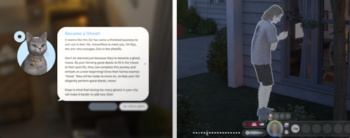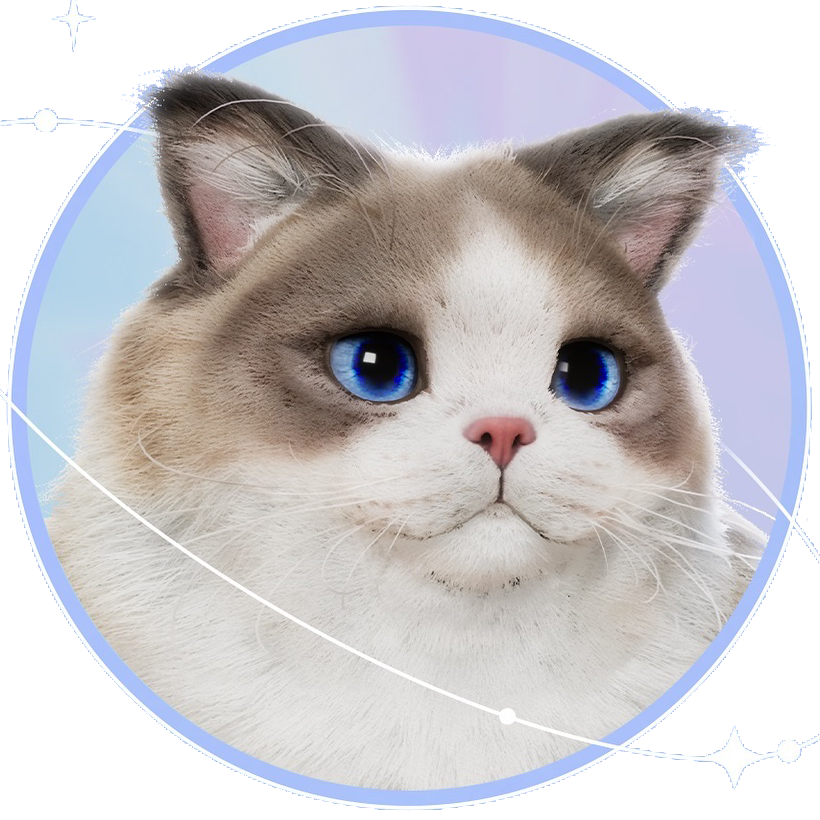Ghosts: Difference between revisions
No edit summary |
m Text replacement - "400px|right" to "350px|right" |
||
| (9 intermediate revisions by the same user not shown) | |||
| Line 1: | Line 1: | ||
{{stub}} | {{stub}} | ||
[[ | {{see also|inZOI|Karma|Deaths}} | ||
[[File:ghosts1.png|350px|right]] | |||
When a [[Zoi]] with a [[Bad]] or [[Terrible]] [[karma]] status dies, they become a '''ghost'''. In the [[death]] notification, clicking [[On to the Afterlife]] will summon [[Nyx]], a member of [[AR Company]], who will explain that the Zoi is now a '''ghost'''. A ghost Zoi can ascend and move on to their next journey by restoring their karma to [[Good]] through [[interactions]] with other Zois. In a way, this is their chance to cleanse the burdens of their past life. Living Zois can only see ghosts at certain times and under specific conditions. While ghosts try to take advantage of this event for their next journey, their presence may startle or frighten the living. But instead of running away in fear, why not take a moment to listen to their story? | |||
== Karma-Based Approach == | ==Karma-Based Approach== | ||
* | In inZOI, each action a [[Zoi]] takes, whether benevolent or mischievous, contributes to its [[karma]] tally. Upon death, a karma evaluation determines a Zoi’s next step: | ||
* | * '''Transition to the Afterlife:''' A Zoi with sufficiently high positive karma seamlessly moves on to the [[afterlife]]. | ||
* '''Becoming a Ghost:''' A Zoi with insufficient karma lingers in the living world as a ghost. In this spectral form, it may continue earning or losing karma, attempting to redeem itself enough to pass on. | |||
Recent developer interviews reveal an additional, more dramatic implication of the karma system: if too many Zois become ghosts, new Zois cannot be born and families cannot form, effectively creating a [[ghost town]]. Players are thus responsible for maintaining reasonable karma levels among their Zois to avoid overpopulating their [[city]] with restless spirits. | |||
== | ==Ghost Encounters & Gameplay== | ||
During [[Early Access]], ghost appearances are intentionally limited. Players cannot take direct control of ghosts but may witness them at specific times or under certain conditions. These encounters—whether eerie, emotional, or even humorous—reflect each ghost’s unresolved issues and personality [[traits]] from life. | |||
== | ==Planned Features== | ||
The development team plans to expand ghost-related content after [[Early Access]], adding depth without overshadowing core life simulation. | |||
* '''Ghost Appearance Rate Slider:''' Control how frequently ghosts appear, from none at all to a city overrun by spirits. Higher settings make it more challenging to help ghosts earn enough karma to move on. | |||
* '''Atmospheric Encounters:''' Expect more startling and unsettling appearances—although some moments could be lighthearted. Living Zois can also experience [[Lingering Fear]] if caught off-guard by a ghost. | |||
* '''Emotional Reunions:''' Not every encounter will be frightening; ghosts may reunite with loved ones for poignant or dramatic moments. | |||
* '''Ghost Scholars:''' New [[jobs]] like [[clairvoyant]]s could enable Zois to sense and communicate with ghosts more effectively. | |||
* '''Traits Carry Over:''' Ghosts retain the personality traits they had in life. A gentle Zoi remains calm, while a bully becomes a mischievous or frightening spirit. | |||
* '''Special Ghost Tasks:''' Ghost-only objectives provide supernatural storylines for players seeking more fantasy elements. | |||
* '''Cultural Influences:''' [[Dowon]]’s ghosts will incorporate Korean folklore, adding regional flavor and variety to each [[location]]. | |||
== | ==Ghost Town Scenario== | ||
If a large number of Zois die with poor karma, their spirits may accumulate, halting new births and family formations in the [[city]]. This mechanic can result in a literal [[ghost town]], forcing players to address rampant negative karma and work toward freeing the spirits. It adds strategic depth to everyday interactions: even minor negative behaviors, like constantly disturbing other Zois, can have lasting consequences for the entire city. | |||
== | ==Balancing Realism and Fantasy== | ||
''inZOI'' strives for a realistic life simulation while embracing fantasy through its ghost mechanics. These spectral encounters can be haunting, poignant, or surprisingly comedic, offering a break from everyday routines. The developers note that these features—and the karma system—are not meant to enforce only “good” actions, but rather encourage diverse player-driven stories and moral nuances. | |||
[[Category:Features]] [[Category:Game Mechanics]] | |||
[[Category: | |||
Latest revision as of 04:57, 30 March 2025

When a Zoi with a Bad or Terrible karma status dies, they become a ghost. In the death notification, clicking On to the Afterlife will summon Nyx, a member of AR Company, who will explain that the Zoi is now a ghost. A ghost Zoi can ascend and move on to their next journey by restoring their karma to Good through interactions with other Zois. In a way, this is their chance to cleanse the burdens of their past life. Living Zois can only see ghosts at certain times and under specific conditions. While ghosts try to take advantage of this event for their next journey, their presence may startle or frighten the living. But instead of running away in fear, why not take a moment to listen to their story?
Karma-Based Approach
In inZOI, each action a Zoi takes, whether benevolent or mischievous, contributes to its karma tally. Upon death, a karma evaluation determines a Zoi’s next step:
- Transition to the Afterlife: A Zoi with sufficiently high positive karma seamlessly moves on to the afterlife.
- Becoming a Ghost: A Zoi with insufficient karma lingers in the living world as a ghost. In this spectral form, it may continue earning or losing karma, attempting to redeem itself enough to pass on.
Recent developer interviews reveal an additional, more dramatic implication of the karma system: if too many Zois become ghosts, new Zois cannot be born and families cannot form, effectively creating a ghost town. Players are thus responsible for maintaining reasonable karma levels among their Zois to avoid overpopulating their city with restless spirits.
Ghost Encounters & Gameplay
During Early Access, ghost appearances are intentionally limited. Players cannot take direct control of ghosts but may witness them at specific times or under certain conditions. These encounters—whether eerie, emotional, or even humorous—reflect each ghost’s unresolved issues and personality traits from life.
Planned Features
The development team plans to expand ghost-related content after Early Access, adding depth without overshadowing core life simulation.
- Ghost Appearance Rate Slider: Control how frequently ghosts appear, from none at all to a city overrun by spirits. Higher settings make it more challenging to help ghosts earn enough karma to move on.
- Atmospheric Encounters: Expect more startling and unsettling appearances—although some moments could be lighthearted. Living Zois can also experience Lingering Fear if caught off-guard by a ghost.
- Emotional Reunions: Not every encounter will be frightening; ghosts may reunite with loved ones for poignant or dramatic moments.
- Ghost Scholars: New jobs like clairvoyants could enable Zois to sense and communicate with ghosts more effectively.
- Traits Carry Over: Ghosts retain the personality traits they had in life. A gentle Zoi remains calm, while a bully becomes a mischievous or frightening spirit.
- Special Ghost Tasks: Ghost-only objectives provide supernatural storylines for players seeking more fantasy elements.
- Cultural Influences: Dowon’s ghosts will incorporate Korean folklore, adding regional flavor and variety to each location.
Ghost Town Scenario
If a large number of Zois die with poor karma, their spirits may accumulate, halting new births and family formations in the city. This mechanic can result in a literal ghost town, forcing players to address rampant negative karma and work toward freeing the spirits. It adds strategic depth to everyday interactions: even minor negative behaviors, like constantly disturbing other Zois, can have lasting consequences for the entire city.
Balancing Realism and Fantasy
inZOI strives for a realistic life simulation while embracing fantasy through its ghost mechanics. These spectral encounters can be haunting, poignant, or surprisingly comedic, offering a break from everyday routines. The developers note that these features—and the karma system—are not meant to enforce only “good” actions, but rather encourage diverse player-driven stories and moral nuances.

